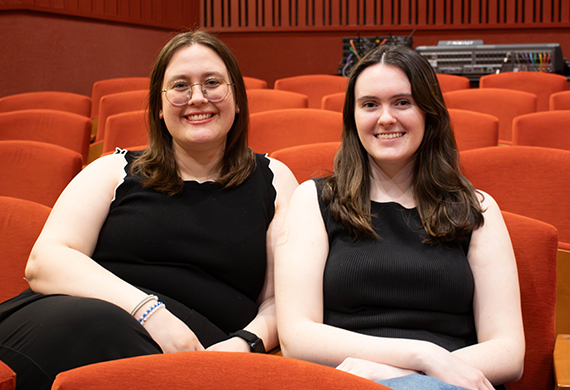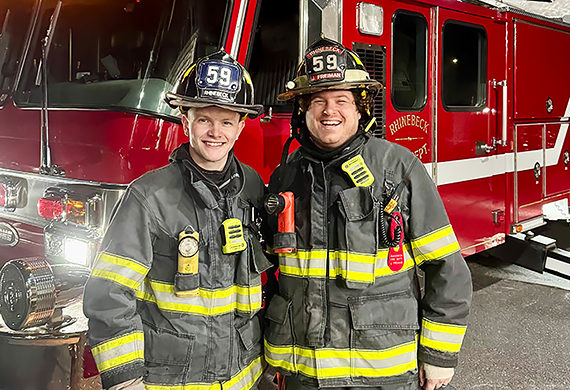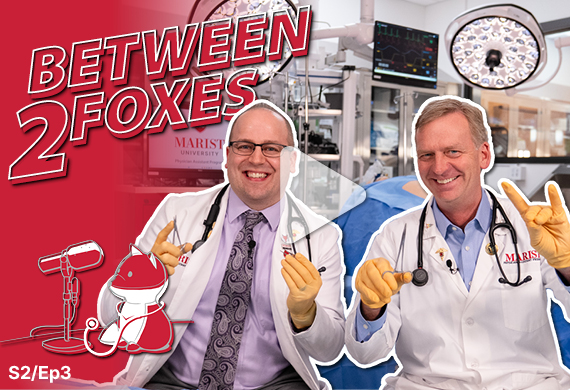Remembering the Trip of a Lifetime
March 14, 2019—“It’s what gets them out of bed in the morning.” So says Director of Choral Activities Sarah Williams about the students in Marist’s Music Program. The College does not have a music major, so all of the students in the various choral and orchestral groups spend hours rehearsing and performing for the simple love of music. Because of this passion, a group of 30 Marist students and recent alumni from the College’s choral program made the trip of a lifetime to Austria, sharing their musical talents in the land of Mozart, Haydn, and Schubert. The Marist Singers, led by Williams, gave a series of public concerts at prestigious venues in Vienna, Eisenstadt, Mondsee, and Hallstatt before heading to Mozart’s hometown of Salzburg to participate in World Choral Fest (WCF), whose aim is “bringing the world together in song.” The festival culminated in a dramatic performance of both classic and new choral works inside the elegant Salzburg Cathedral, where the public treated them to a standing ovation.
Marist does not have a music major, but thanks to Williams, a classically trained vocalist, students get a true musical education. Indeed, the invitation to participate in WCF reflects the Music Program’s growing reputation for excellence. Williams demands a great deal of her students, knowing that there is a big difference between a good choir and a great choir. As she describes it, choir is a “team sport” and, indeed, the group shares a special bond that remains strong even after graduation. Choral music creates a certain kind of intimacy: the Marist Singers spend hours together rehearsing, performing, and pushing themselves, and they have to trust one another. Says Williams, “They trust me completely because I trust them.”
Marist singers in Hallstatt, Austria
The Marist Singers’ trip to Austria had endless highlights and special memories, particularly for these aficionados of classical music. Upon arrival in Vienna, the bleary-eyed group visited that city’s Central Cemetery, where Beethoven, Brahms, and other great composers are buried. The evening was spent at Heurigen, a typical Austrian wine tavern. After a full night’s sleep, it was off to the city of Eisenstadt, where the Singers visited Haydn’s mausoleum and performed in the magnificent Schloss Esterhazy, a 13th-century palace belonging to the Esterhazy family, who were Haydn’s patrons. The concert took place in the recital hall where Haydn himself played music, a place not only with a storied history but also with unsurpassed acoustics. As Williams told the Singers after their performance, “Marist has left its mark at Esterhazy. This is your legacy.”
The group’s next concert took place in an even more public setting – St. Stephen’s Cathedral in the heart of Vienna’s Old City. St. Stephens is where Mozart married, served as musical director, and where his funeral was ultimately held. Asked to describe the experience of performing in the magnificent 12th-century cathedral, Justin Camero ’20 of Pico Rivera, California responded, “I felt completely immersed in the music. In that moment, nothing else existed but us and the music. To leave my mark on a historic place like this was an amazing opportunity.” Nikki Barrett ’19 of Shrewsbury, Massachusetts felt a similar sensation, as if the rest of the world were slipping away, noting that “when you sing in a choir, your heartbeat lines up with the others.” Barrett also alluded to the therapeutic power of music for both the performer and the listener, adding that she sings in order to share the beauty of music with others. “There might be one person in the audience who really needed to hear you sing.”
On the way from Vienna to Salzburg, the Singers had another opportunity to perform in a celebrated church, St. Michael’s in the quaint mountain town of Mondsee. The church was made famous in the wedding scene from The Sound of Music. Asked for a one-word reaction immediately after finishing their concert in the ornate venue, the Singers uttered words like “speechless,” “inspired,” “joyous,” “uplifted,” “humbled,” and “awestruck.” Austria is a country in which the general public appreciates classical music, and concerts tend to be well attended. The attendees at the Marist Singers’ performances were extremely receptive to their a cappella stylings and complimentary of their vocal talents.
When the Singers arrived in Salzburg for WCF 2018, they joined a group of approximately 45 other vocalists from around the world and had four days to prepare for the big concert in the city’s magnificent Cathedral. There was, of course, time to visit Mozart’s birthplace and the famous Hohensalzburg Fortress, as well to give as a final lunchtime concert in Hallstatt, a picturesque Alpine town. The WCF finale in Salzburg Cathedral featured the world premiere of composer Dan Forrest’s “Non Nobis Domine,” as well as his “Jubilate Deo,” a choral work in seven parts. Other selections included “Benedictus sit Deus K117” and “Ave Verum” by Mozart and “Hamba Nathi,” a traditional Zulu song arranged by Moritz Guttmann.
World Choral Festival performance at Salzburg Cathedral
The many Salzburgers in attendance expressed their appreciation for the concert with a standing ovation. Tracy Resseguie, WCF’s founder and creative director described the emotion of final performance in this way: “The performance in the Salzburg Cathedral was the culmination of so much work, practice, energy, and anticipation. You give it everything you have, and when it’s over, you’re physically exhausted.” Barrett had a similar reaction after it was all over: “I feel drained, but my heart is full.” Raquelle Rocco ’21 of Parsippany, New Jersey was also extremely moved by the experience. “I felt a wave of emotion seeing the reaction of the audience. I know we touched people.”
As an artistic and cultural journey, the Marist group’s experience was both wholly unique and extremely meaningful. And it speaks to the College’s commitment to providing students with opportunities for experiential learning. As Dean of the School of Communication and the Arts Lyn Lepre, who sang with the group in Austria, said, “Marist is an amazing place for students to become what they’re meant to become. We recognize that there is value in all sorts of activities, both inside and outside the classroom.” Reflecting back on the trip to Austria, history major Rocco was likewise philosophical: “I’m not sad that everything is over. I’m just grateful it happened.”



